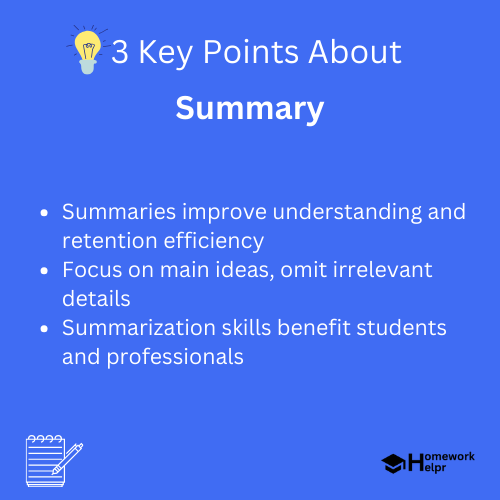📝 Summary
In today’s fast-paced world, the skill of summarization is essential for both students and professionals. A summary distills the essence of larger texts into manageable forms by capturing main ideas while excluding unnecessary details. Effective summarization enhances comprehension and retention, allowing individuals to communicate ideas clearly. Key elements of a good summary include identification of core concepts, clarity in language, and proper structure. By mastering summarization, one can navigate vast amounts of information efficiently, ultimately improving communication and understanding across various contexts.
Understanding the Importance of Summaries
In today’s fast-paced world, the ability to summarize information effectively is a crucial skill for students and professionals alike. A summary allows one to distill the essence of a larger text or presentation into a more manageable form. With the vast amount of information available, learning to synthesize it will help in both studying and communicating ideas clearly.
Summarization is not simply about shortening a text; it’s about capturing the main ideas while omitting extraneous details. By focusing on key concepts, students can improve their understanding of the material and enhance their ability to recall information, making studies much more efficient.
What is a Summary?
A summary is a brief statement or account of the main points of a text. The process involves reading or listening and identifying the most important aspects of the information shared. In writing a summary, one must focus on clarity and conciseness. The objective is to convey the primary message without including personal opinions or irrelevant details.
Summaries can be utilized in various contexts, whether for academic purposes, business reports, or personal note-taking. Learning how to summarize effectively can significantly improve comprehension and retention of information.
Definition
Summarize: To present the main points of a text in a condensed form. Conciseness: The quality of being brief and to the point, without unnecessary words.
Key Elements of a Good Summary
When creating a summary, one should consider several key elements that contribute to an effective and coherent summary:
- Identification of Main Ideas: Focus on the core ideas presented in the text.
- Exclusion of Irrelevant Details: Remove examples, anecdotes, and less significant facts.
- Use of Clear Language: Ensure that your language is easy to understand for your audience.
- Proper Structure: Organize the summary logically, often mirroring the structure of the original text.
By integrating these components, you can create a summary that successfully conveys the purpose of the original work.
Examples
For instance, if summarizing a chapter from a history book, you would extract key events, significant figures, and essential dates rather than detailing every event in the chapter.
Steps to Write a Summary
Writing a summary can be streamlined into specific steps, which include:
- Read or Listen Carefully: Engage with the material through attentive reading or listening.
- Highlight Key Points: Identify and underline important ideas and concepts.
- Draft Your Summary: Write down the main ideas in your own words.
- Revise and Edit: Ensure that your summary is coherent, concise, and free of mistakes.
Following these steps will aid in transforming complex data into an understandable format that is both informative and accessible.
Common Mistakes to Avoid
While summarizing, students often make several common mistakes that can lead to an ineffective summary. Some of these include:
- Including Personal Opinions: A summary should remain objective without personal interpretations.
- Overloading with Details: A summary should be brief; adding too many details can defeat the purpose.
- Lack of Structure: A well-structured summary is easier for readers to follow.
Being mindful of these common pitfalls will enhance your summarization skills and lead to more successful writing experiences.
Applications of Summarization Skills
Summarization skills are not only relevant in academic settings but have real-world applications as well. For instance:
- In Education: Students can use summaries to prepare for tests or review materials.
- In Business: Professionals often create summaries of reports for board meetings, making information digestible.
- In Everyday Life: Summarizing news articles or books for discussions can enhance communication.
❓Did You Know?
Did you know that summarizing long texts can improve memory retention by up to 30%? This means you not only save time but also learn better!
Tools for Effective Summarization
Luckily, there are tools and techniques available to help with summarization. These include:
- Word Processors: Many word processing software programs have built-in summarization features.
- Mind Mapping: Creating visual representations of the material can help in identifying main ideas.
- Summarization Tools: Websites and apps specifically designed to condense information can be valuable resources.
Using these tools can augment your summarization effort, giving you more time to focus on understanding the content.
Conclusion
Learning to summarize effectively is a transformative skill that greatly benefits students and professionals. By mastering the art of summarization, individuals can improve their understanding, retention, and communication of important information. As we navigate through vast amounts of data in our lives, being equipped with the ability to succinctly convey key messages is an invaluable asset.
As you continue to develop these skills, remember that practice makes perfect. Every time you summarize a book, an article, or a lecture, you are improving a critical skill that will serve you for the rest of your academic and professional life.

Related Questions on Summary
What is the definition of a summary?
Answer: A summary is a brief account of main points.
Why is summarization important?
Answer: It improves communication and understanding of information.
What are common mistakes in summarization?
Answer: Including personal opinions and overloading with details.
How can summarization skills be applied?
Answer: In education, business, and everyday discussions.
